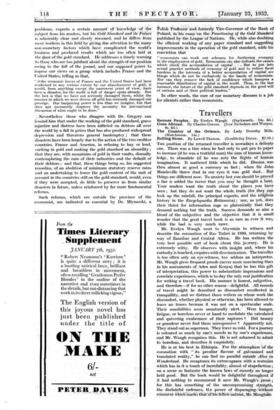The Future of the Gold Standard The Gold Standard and
its Future. By T. E. Gregory, D.Sc.. (Methuen. 38. 6d.) WHILE many are preaching the funeral sermon of the Golden
Calf, here we have two distinguished authorities assuring us that a revival of its worship is essential, owing to the immense difficulties that lie in the way of working any possible substitute.
Professor Gregory, a member of the Macmillan Committee and an indefatigable worker as an exponent of monetary
problems, expects a certain amount of knowledge rof :the subject from his readers, but his'dold Standard arid iliPahire js admirably clear and closely reasoned, and. he differs from most 'workers in this field by giving due attention to the many non-monetary factors which have complicated the world's business and produced results which are too often laid at the door of the gold standard. He addresses a timely warning to those who are too jubilant about the strength of our position owing to the fall of the pound, and our supposed power to impose our views on a group which includes France and the I 'nited States, telling us that, " if the economic forces of France and the United States had been weakened to any serious extent by our abandonment of gold; it would, from anything except the narrowest point of view,• hawk been a disaster, for the world is full of danger spots already. But the fact is that we have not seriously damaged them, whilst the manner in which we were driven off gold has seriously damaged our prestige. Our bargaining power is less than we imagine, but that does not necessarily disprove the necessity for international discussion of what ought to be done."
„ Nevertheless those who disagree with Dr. Gregory can fttnind him that under the working of the gold standard, grave injustice and distress have been inflicted on debtors all over the world by a fall in prices that has also produced widespread depression and threatens general bankruptcy ; that these disasters have been largely due to the action of the two creditor countries, France and America, in refusing to buy or lend, sucking in gold and making the gold standard an absurdity ; that they are, with mountains of gold in their vaults, dismally contemplating the ruin of their industries and the deftudi of their debtors ; and that, these things being so, his suggested remedies, of an abolition of minimum statutory reserve rates and an undertaking to lower 'the gold content of the unit of account in the countries still on the gold standard, would, even if they were accepted, do little to preserve us from similar disasters in future, unless reinforced by far more fundamental reforms.
Such reforms, which are outside the province of the economist, are indicated as essential by Dr. Mlynarski, a
Pioreasol-ind,:forriterlY Vice-Governor of the Bank of in- his essay the- Functioning of the Gold Standard -published by the League ofNations. He, while also doubting the efficient working of any paper standard and suggesting improvements in the operation of the gold standard, addS his conviction that " economists can work out schemes for furthering economy in the employment of gold. Economists can also indicate the causes which check the accumulation of capital ." -. But • to put into actual practice methods of economy of gold and to reduce fiscal burdens in the interests of a better accumulation of capital are 'things which do not lie exClusively in the hands of economists. Nor can they remove the lack of confidence which hampers a reasonable distribution of capital in the world. Thus, in the last instance, the future of the gold standard depends on the good will of nations and of their political leaders."
In other words, the cure of our monetary diseases is a job for alienists rather than economists.





































 Previous page
Previous page